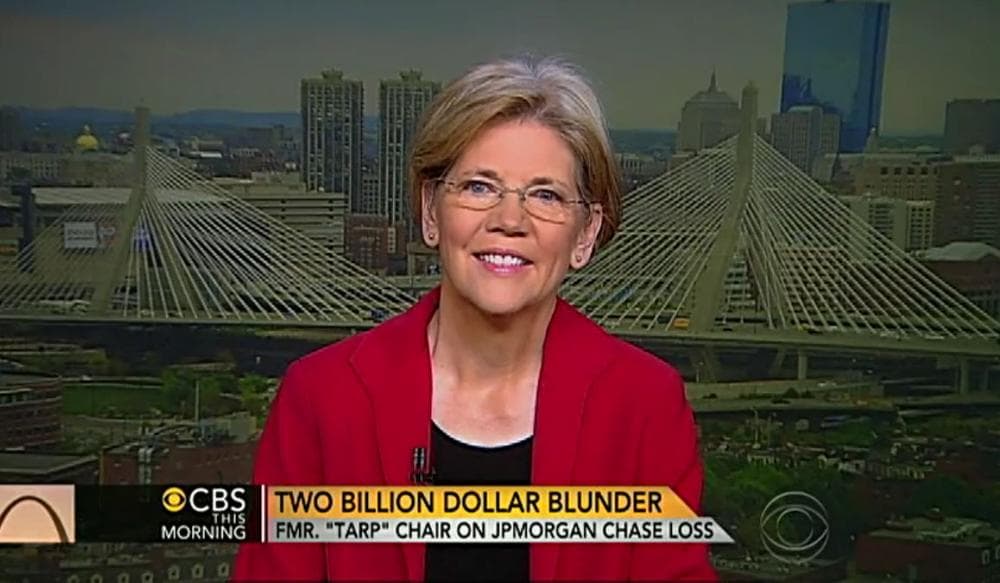Advertisement
COMMENTARY
Can Warren Get Her Mojo Back?

Elizabeth Warren, who showed so much promise in Washington tracking TARP bailouts and insisting on tighter regulation of financial institutions, has been noticeably timid in Massachusetts. Letting Scott Brown get away with voting against freezing college loan rates in a state with 160,000 students is unforgivable for a college professor.
However, she may have found her mojo in blasting banker Jamie Dimon. She called for the CEO of JPMorgan Chase, which admitted to $2 billion in risky investment bets, to step down from the New York Federal Reserve, which oversees Wall Street banks and financial institutions. Given the way Dimon oversaw his own bank’s finances, it’s hard to imagine how he’d have the time, much less the ability, to monitor other banks’ practices.
Dimon In The Rough
Scott Brown’s handlers put out a statement saying the huge loss was a matter for the bank’s shareholders, which is a little like saying the Red Sox losses are a matter for season ticket holders.
The 300 shareholders who went to Tampa for the bank’s annual meeting ignored Dimon’s losses and roughed him up a little verbally. Then they voted to keep his salary at $23 million. As he put it afterward, “The buck stops with me.”
Actually, a lot of bucks stopped with him.
Dimon passed the buck and forced out the head of its investment arm, a woman – naturally – named Ina Drew, who had 30 years of service. She apparently tried to resign a while ago, but was kept on undoubtedly so they could scapegoat her once the story broke.
Meanwhile, Warren’s campaign and the candidate herself had been losing precious time trying to explain her de minimis Cherokee connection. The fact that it’s still in the news is testament to campaign malpractice, and I’m not just talking about the candidate. She’s a rookie. She may not know that there is such a thing in politics as saying, "We’re not going to talk about that any longer." Also, the press covers what you give them, especially if it’s conflict. Warren hasn’t conflicted with Brown.
Her ancestry is a problem she brought on herself. Her campaign seems obsessed with making sure we know she had humble beginnings. No matter how many times they tell us her father was a janitor, she’s never going to beat Brown in ordinariness.
By the way, why is President Obama doing a commercial for her where he has to read notes at a lectern to vouch for her? Where’s the teleprompter? Doesn’t he know her? Word is, she was no favorite in the West Wing and Treasurer Tim Geithner saw her as an uppity rival.
Going National
Something changed on Monday when Warren's stinging criticism of Dimon made national news. She was suddenly the right woman at the right time on the right topic. In a curious way, she has been a more compelling figure to the national media than local news outlets. This has also been true for people such as Reps. Barney Frank and Ed Markey — full disclosure: both have been clients of mine.
She should’ve traveled to the bank’s shareholders meeting in Tampa, strictly to keep the press focused on how the 1 percent risk so little besides embarrassment. Likewise, it’s time to retire the hollow and monotonous “standing up for working families” line that her campaign peddles incessantly. She now has the chance to show voters what she’s made of and what kind of senator she will be.
Washington needs a no-nonsense, no-compromise voice against Wall Street abuses. It’s never going to be Scott Brown. He’s incapable, intellectually or politically, of challenging the banks. But, from Warren we get daughter of a janitor.
Brown’s Earmark
Scott Brown supporters like to remind us he voted for Dodd-Frank, the financial reform law, but he did so only after extracting concessions (sometimes called earmarks) for favored local businesses such as State Street bank.
On the other hand, Elizabeth Warren is a walking, talking Dodd-Frank – she came up with the idea of a consumer protection agency for finances. She is a potentially powerful force in Washington who knows how the big boys game the system. Mr. and Mrs. Average don’t much care about policing the markets. But they do know that their lives haven’t been the same since the high flyers on Wall Street fell to earth and took all of us with them.
Go Big
Her campaign has suffered from small caliber thinking. She should run big, employing her financial know-how and willingness to challenge Wall Street, not constantly reminding us of her humble roots. A tough, fancy pants college professor, as she likes to call herself, could be a unique and powerful voice in the senate. The time to make that case is now.
This program aired on May 17, 2012. The audio for this program is not available.
